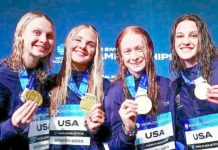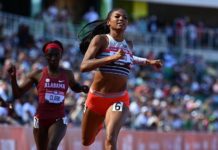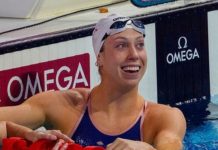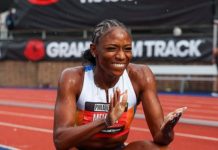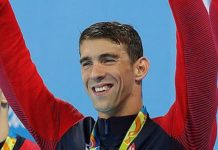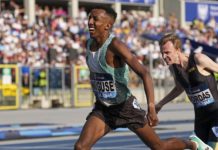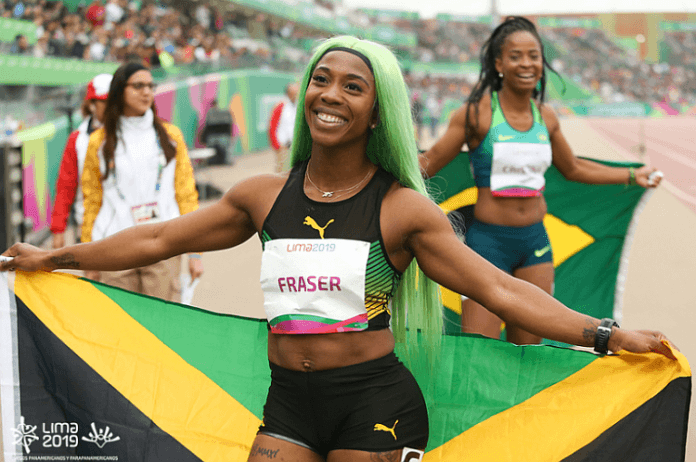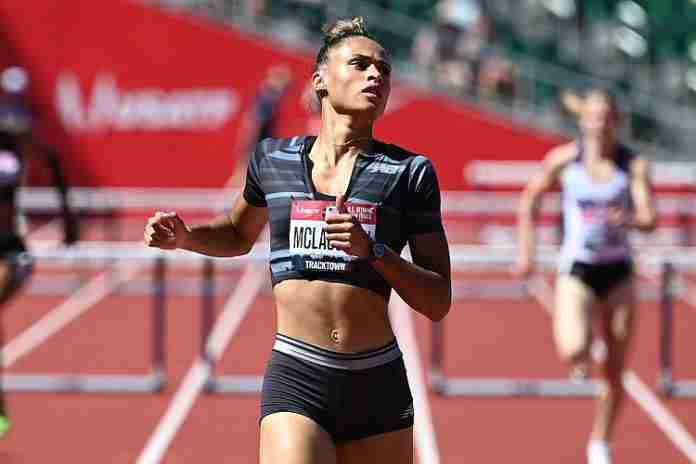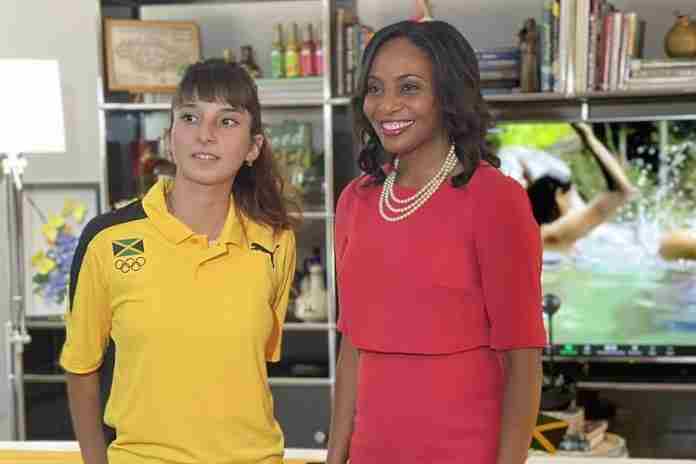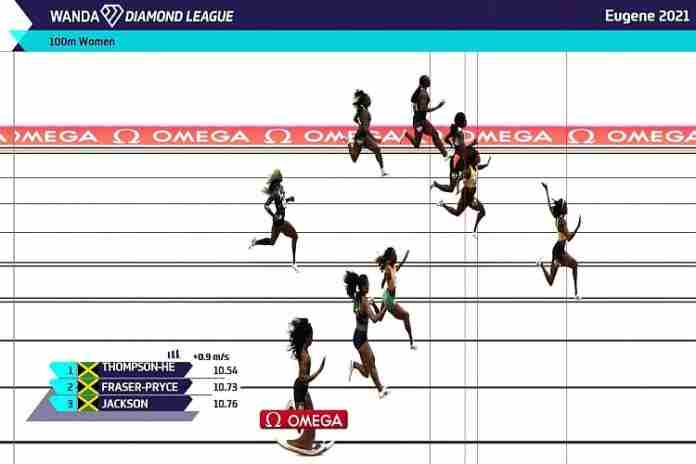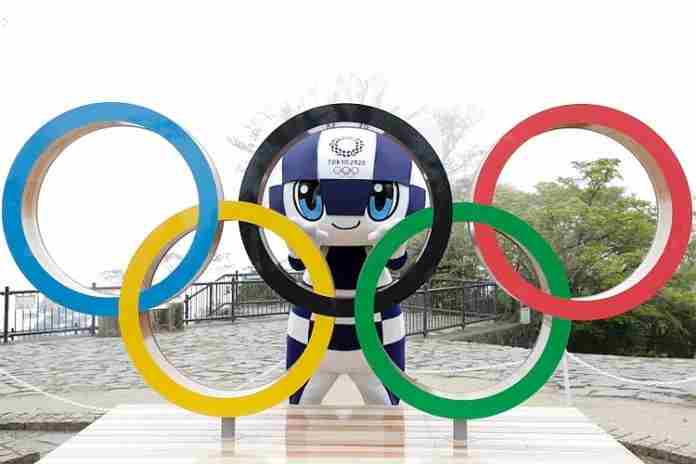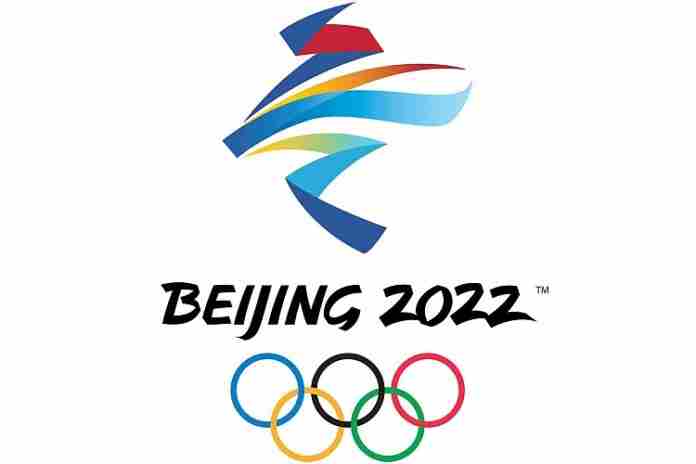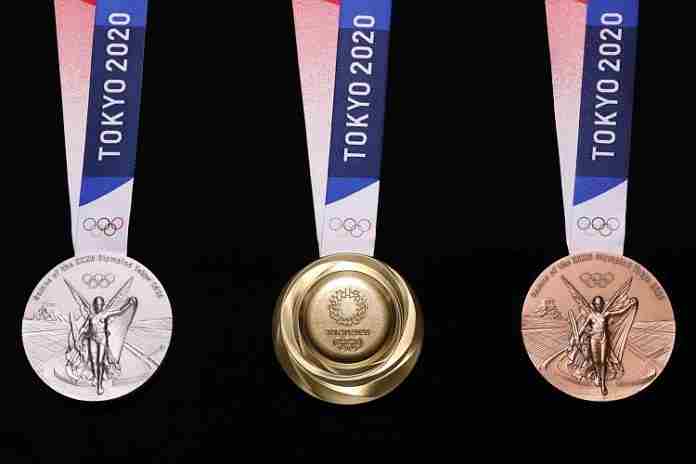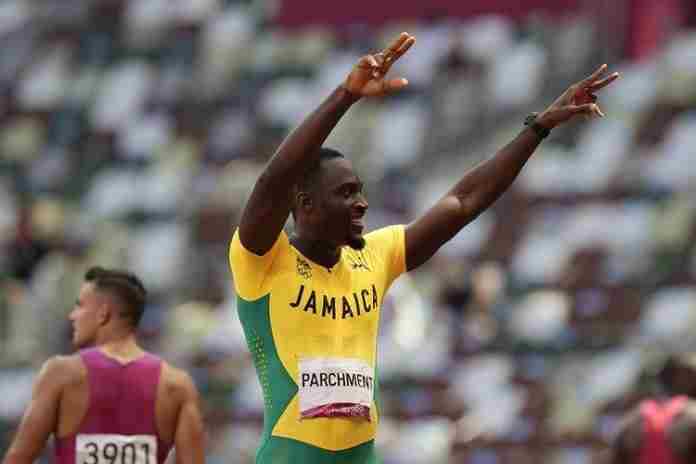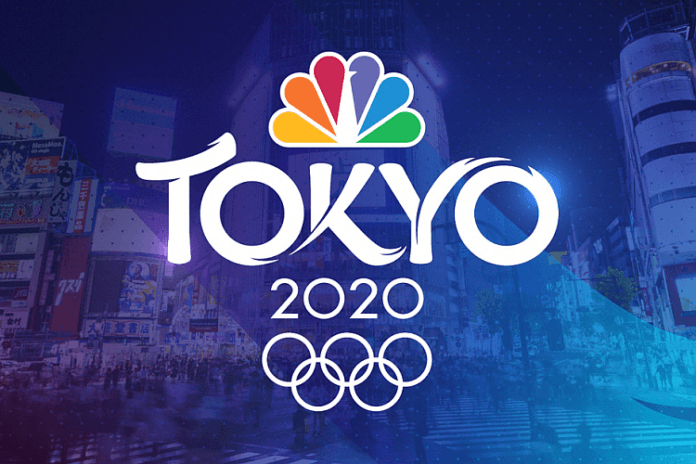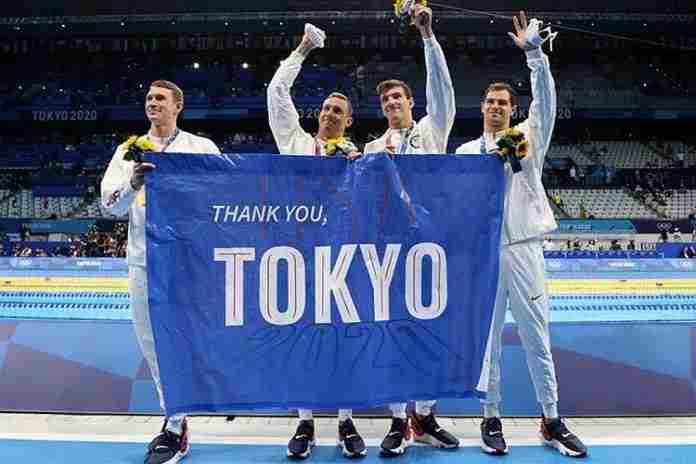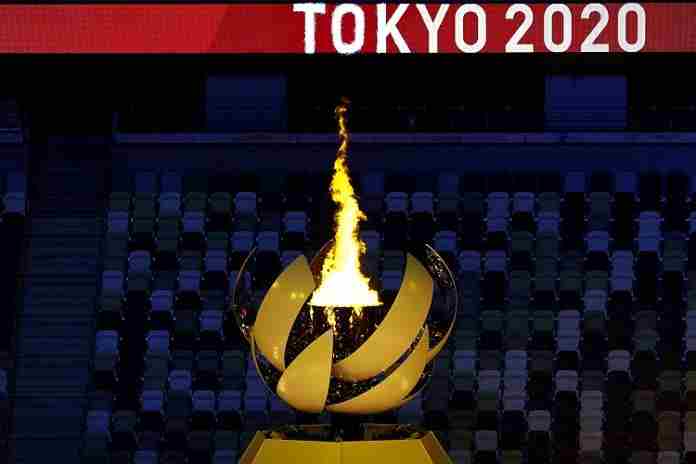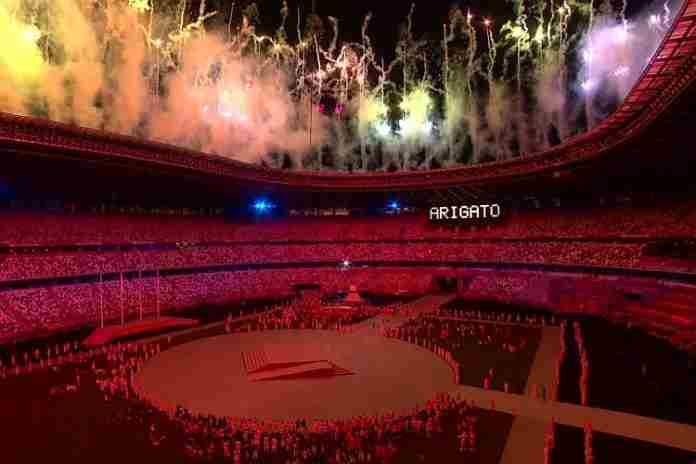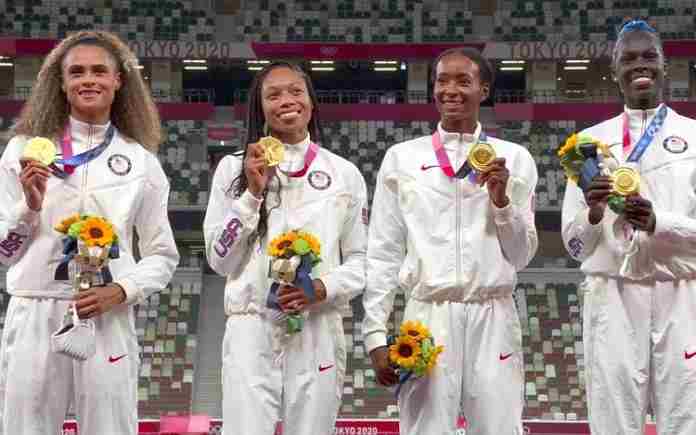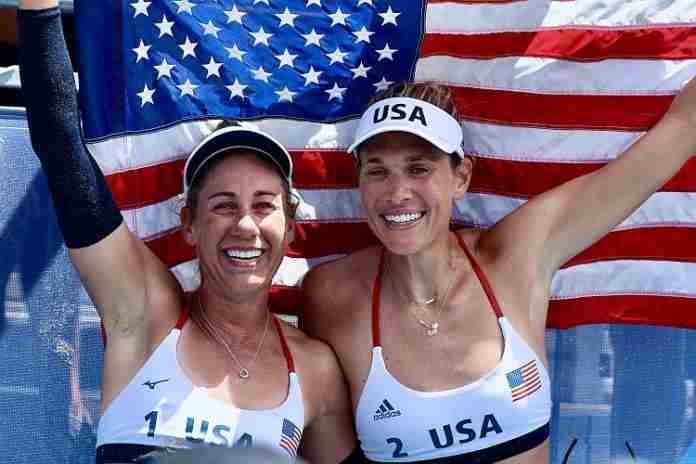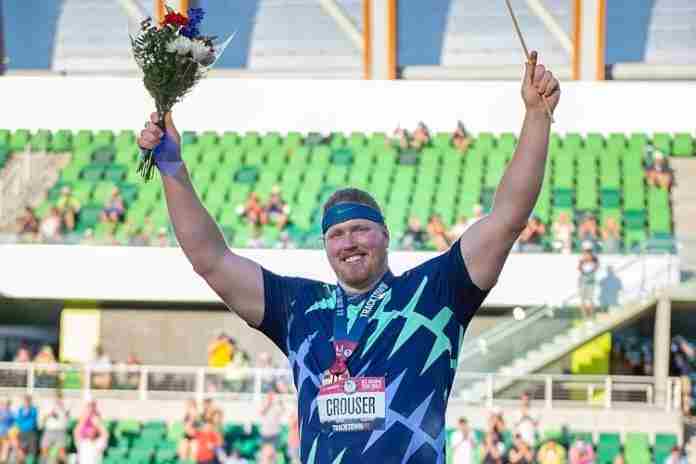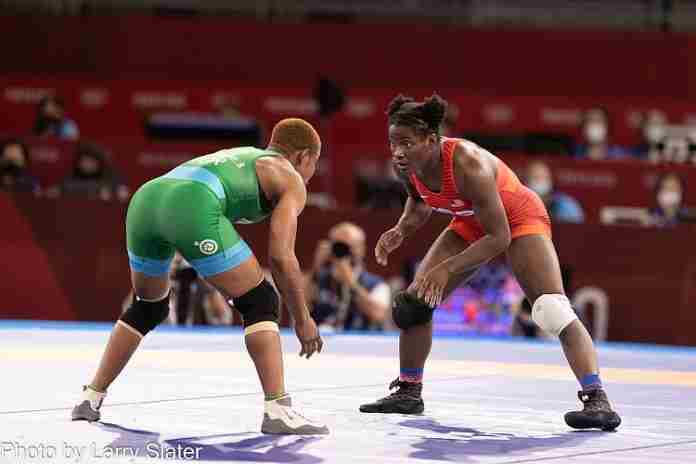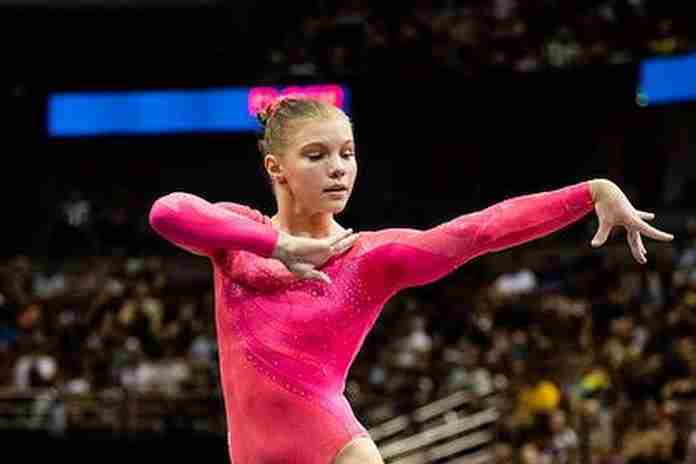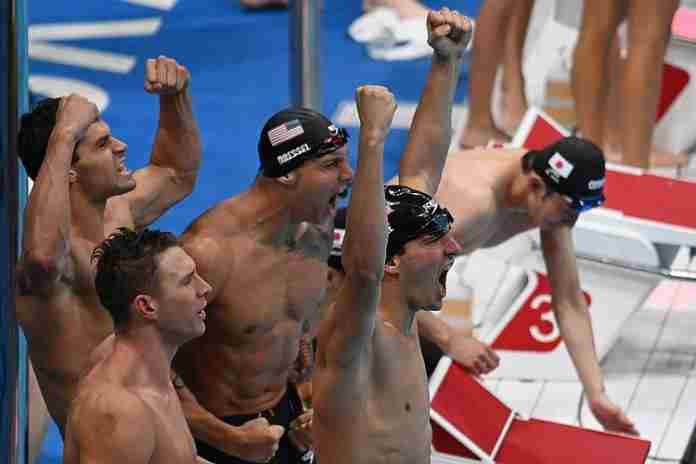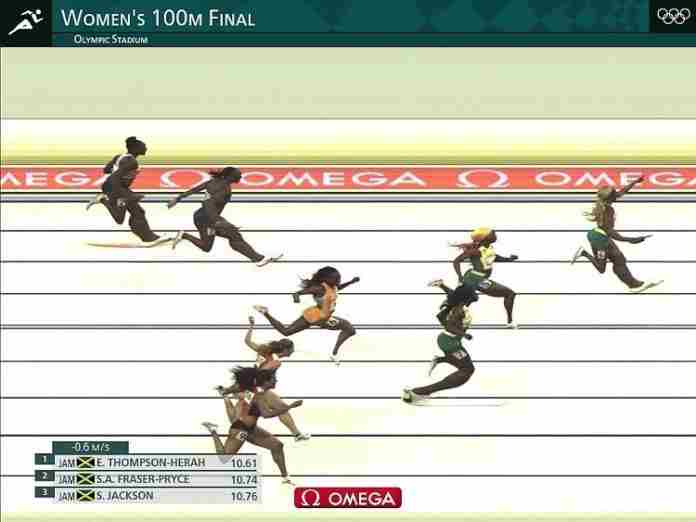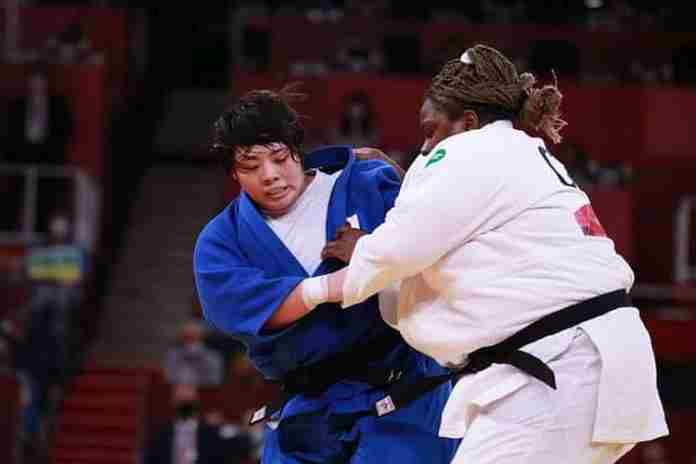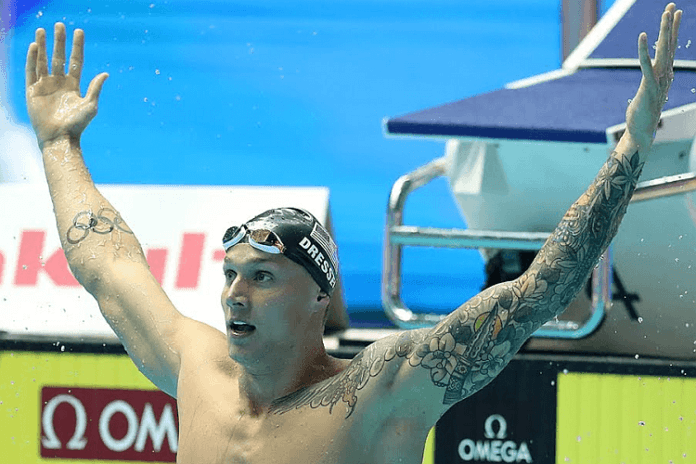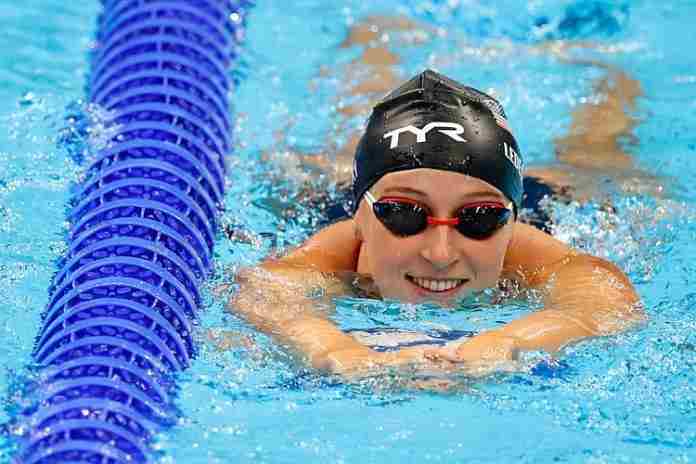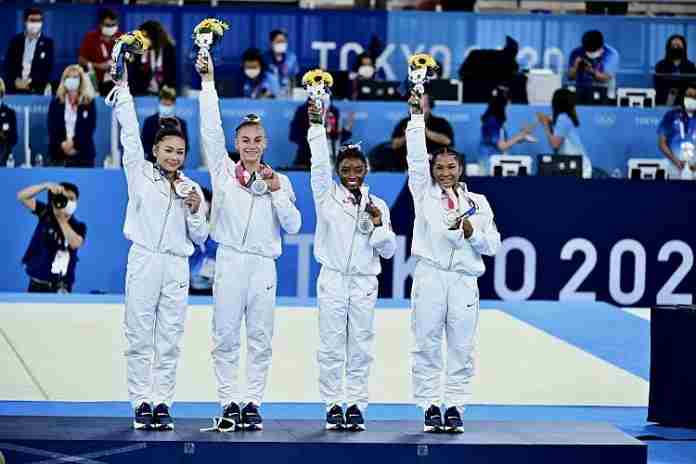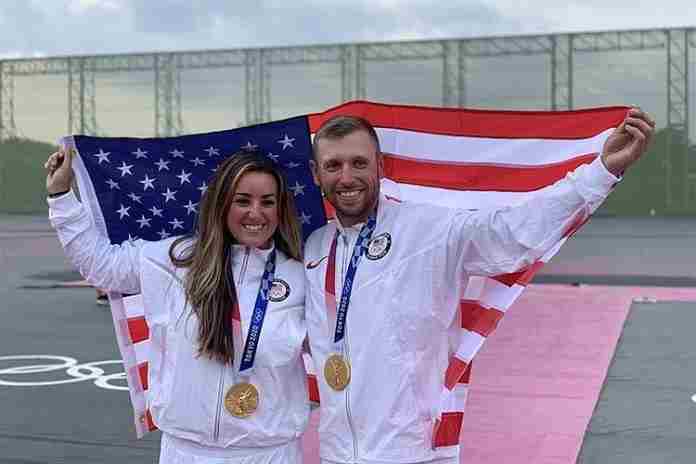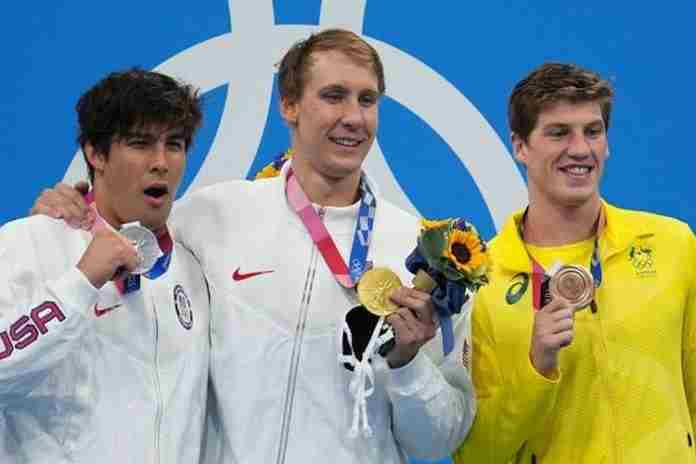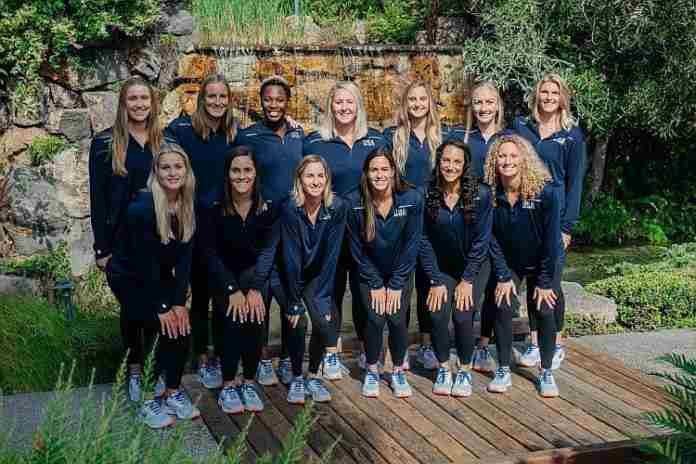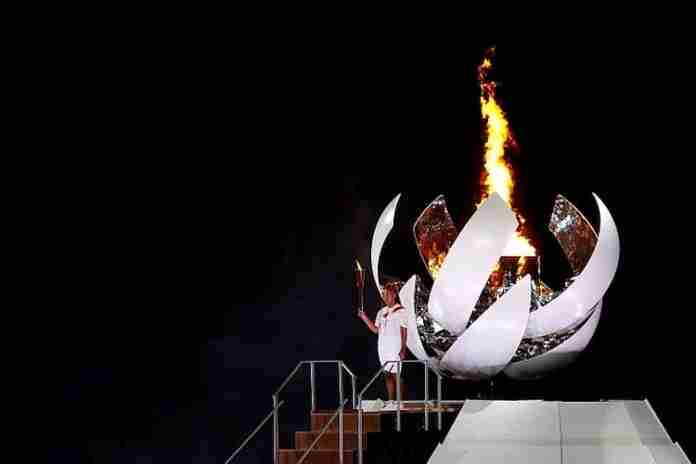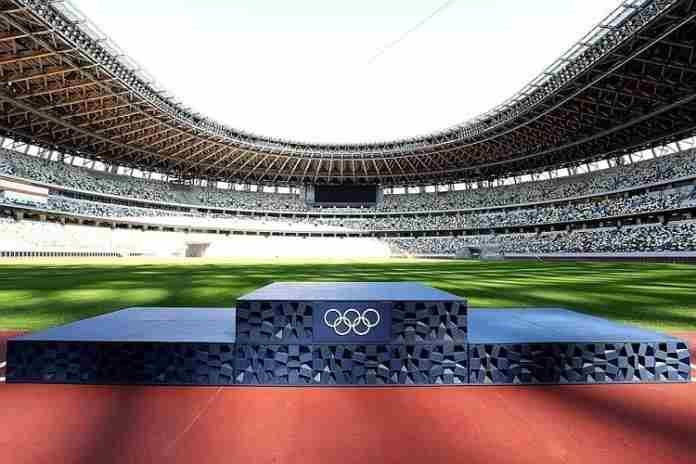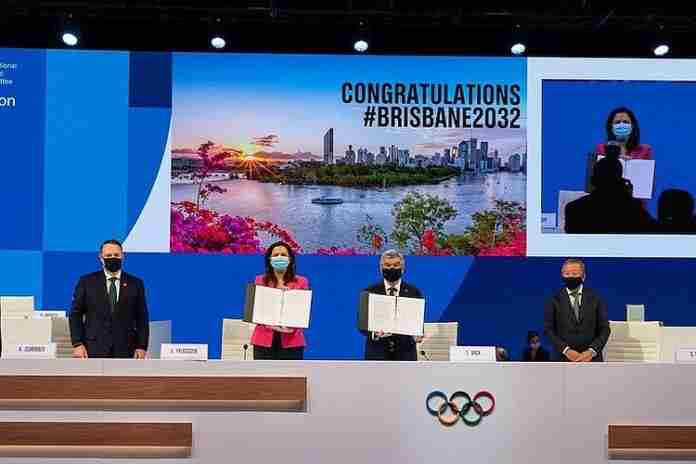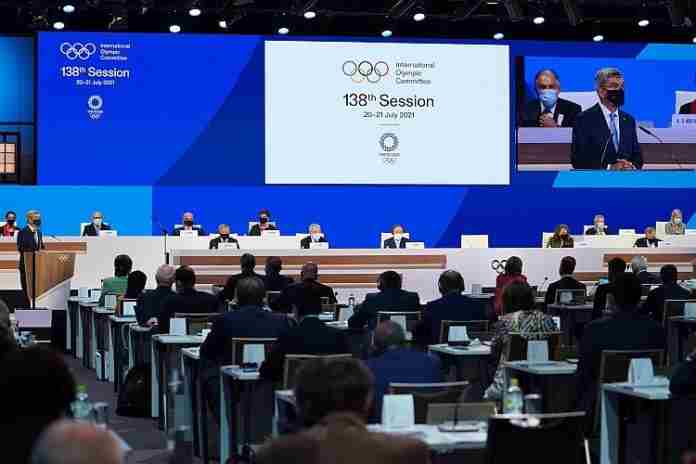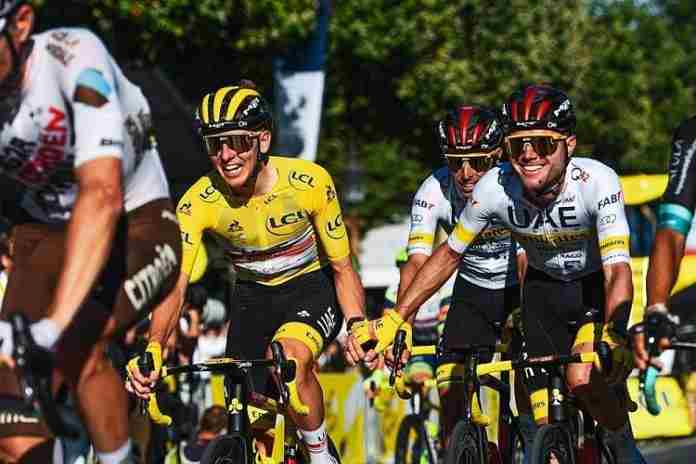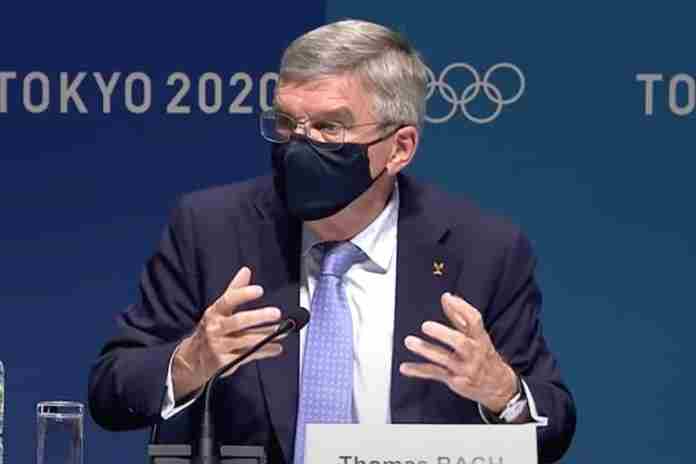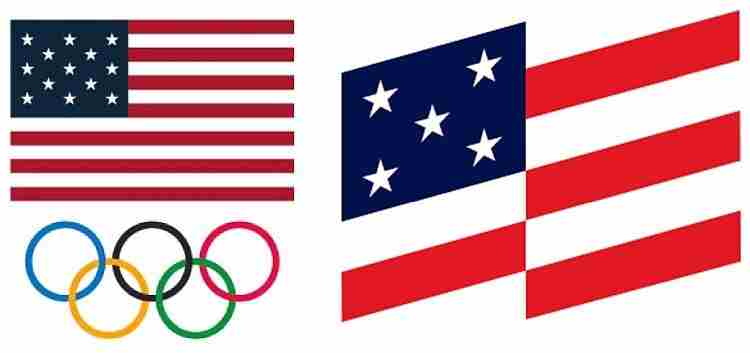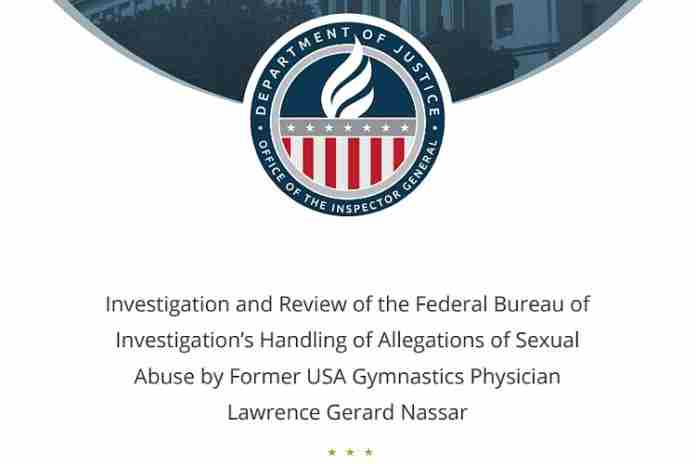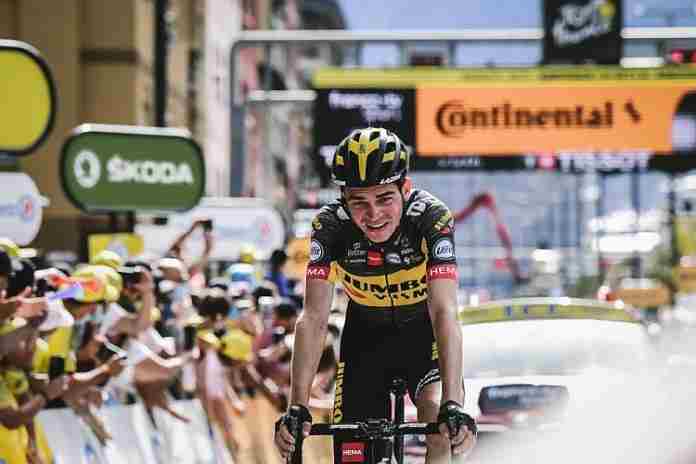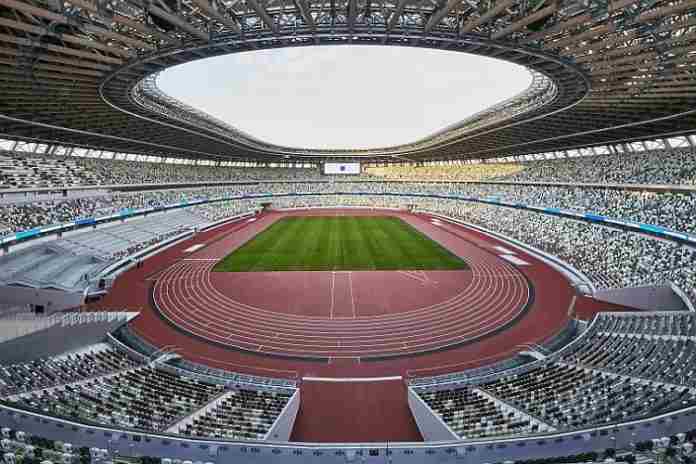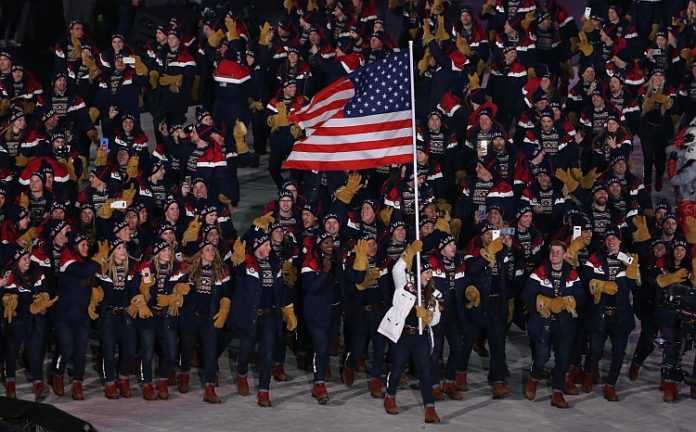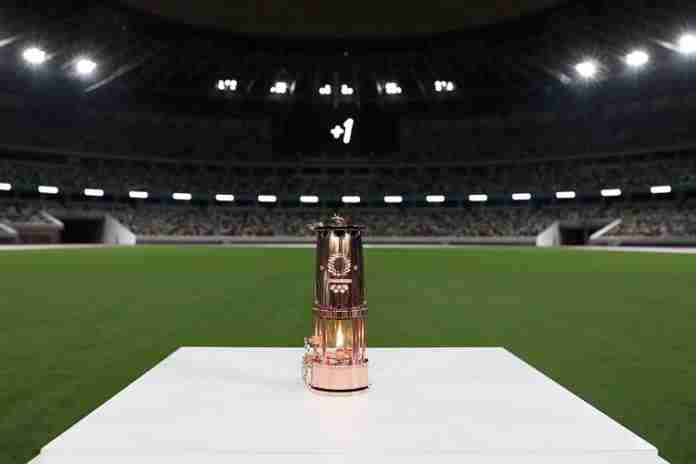(★ Friends: Very grateful to say that 48 donors have now covered 70% of our current server & support bill. If you like this coverage, please donate here. Your enthusiasm is what motivates this site. Thank you. ★)
= TOKYO 2020 =
From Lane One
“After we had to accept the decision by the Japanese authorities to have no spectators, I must admit that we all – and I personally as well, of course – were concerned that these Olympic Games could become the Games without soul.
“But fortunately what we have seen here is totally different, because the athletes gave these Olympic Games a great Olympic soul.”
That was International Olympic Committee President Thomas Bach (GER) in a Friday news conference, expressing his deep satisfaction with the way the Tokyo Games have gone so far, especially the enthusiasm of the competing athletes. He added:
“[T]hese Olympic Games have far exceeded my personal expectations. You know, I never had any doubt about the preparedness of Japan, the organizing committee and the Japanese people; I always said that Tokyo was the best-ever prepared Olympic city. This has proven to be true. The venues are fantastic, everybody appreciated the volunteers, of a friendliness which is exemplary; the organization – after the first hiccups that we always have [at] the Games, it’s always the same topic, transportation – was flawless, so we did not need to have any Coordination meetings for a week. All this was following expectations.
“But then the two factors were my expectations and I have been exceeded is the efficiency of the anti-Covid measures and secondly is what I said before, the soul of the Games, which the athletes gave to these Games, this Olympic soul.”
Bach noted further:
“What I experienced in the Olympic Village, and the competition sites, I must say that the atmosphere has been more intense than ever before. There were among the athletes two dominant feelings. The first was, you could experience and feel and see and hear how much they enjoyed to be together, there, again. How much they enjoyed to meet each other and the other feeling which has expressed in all the many, many conversations I had, were that they are extremely grateful for the fact that the Olympic Games could happen now finally.
“And these feelings, this atmosphere was spreading from the Olympic Village to the competition venues, where you could see how they were supporting each other, how they were appreciating each other in all the venues.
“The reason for this you can discuss, I’ve been thinking quite lot about it and come to the conclusion that these two feelings, of the togetherness and the gratefulness are coming from the fact that they have been separated for such a long time.”
He was also thrilled with the low Covid infection rate among Olympic-related personnel, the absence of any (so far) doping positives and the enormous fan interest in the Games worldwide, especially on digital media.
¶
Through Friday, 292 out of 339 (86%) events have been completed in Tokyo; the current medals leaders:
1. 98: United States (31-36-31)
2. 79: China (36-26-17)
3. 62: Russian Olympic Committee (17-23-22)
4. 58: Great Britain (18-20-20)
5. 51: Japan (24-11-16)
An Olympic-record total of 89 countries have won at least one medal, surpassing the 86 for the 2016 Games in Rio.
Our exclusive TSX team scoring uses the familiar collegiate system of 10-8-6-5-4-3-2-1 per event to give a much better view of the relative achievements of the teams:
1. 1,144.5 United States
2. 848.7 China
3. 654.5 Russian Olympic Committee
4. 649.5 Great Britain
5. 606.5 Japan
6. 496.0 Australia
7. 458.5 Italy
8. 456.0 Germany
9. 401.0 France
10. 382.5 Netherlands
11. 304.5 Canada
12. 261.0 Korea
Note that the top five in this tally correspond exactly – so far – with the total medal count shown above. But we’re not done yet.
¶
NBC’s primetime coverage on Wednesday was down to 14.6 million, one of its lowest totals for the Games. As specific numbers were not given for Saturday and Sunday, the available information shows:
● 23 July (Fri): 8.2 million for the Opening Ceremony
● 24 July (Sat): 15.3 million
● 25 July (Sun): 19.2 million
● 26 July (Mon): 16.8 million
● 27 July (Tue): 16.2 million
● 28 July (Wed): 15.0 million
● 29 July (Thu): 19.5 million
● 30 July (Fri): 15.2 million
● 31 July (Sat): not reported
● 01 Aug. (Sun): not reported
● 02 Aug. (Mon): 15.8 million
● 03 Aug: (Tue): 17.4 million
● 04 Aug: (Wed): 14.6 million
These numbers are for the “total audience” for primetime programming across NBC-NBCSN-CNBC-USA Network, but far behind the Rio 2016 numbers, in a better time zone. NBC says more than 105 million Americans have watched some part of the Games so far.
NBC states that the average is about 16.8 million for the “total audience” in primetime, compared to 27.5 million per night in Rio in 2016.
¶
Hot weather remains a central concern of the Games; the current forecast for the final weekend:
● 07 Aug. (Sat.): 88 F ~ 76 F; scattered thunderstorms
● 08 Aug. (Sun): 88 F ~ 78 F; morning thunderstorms
The forecast for Sapporo for the marathons:
● 07 Aug. (Sat.): projected 77 F at 6 a.m.; sunny (women)
● 08 Aug. (Sun): projected 81 F at 7 a.m.; cloudy (men)
These are warm conditions for endurance events, but cooler than are expected for Tokyo.
~ Rich Perelman
= RESULTS: THURSDAY, 6 AUGUST =
● Athletics: Men’s 5,000 m-4×100 m-50 km Walk
Ugandan world-record holder Joshua Cheptegei made sure not to repeat his errors from the 10,000 m and ensured a fast pace that allowed him to win going away in 12:58.15.
He was in the lead or close to it almost the entire way, with a fast 7:55.3 at 3,000 m and then leading a group of six at the bell, with Nicholas Kimeli (KEN), Paul Chelimo of the U.S., Birhanu Balew (BRN), Ugadan teammate Jacob Kiplimo and Mo Ahmed of Canada.
Cheptegei led, but Kimeli made a surge on the back straight, forcing Cheptegei to sprint to stay ahead going into the curve. Around the turn, Balew fell away and on the straight, Ahmed started a dead sprint with 80 m left that passed Chelimo and Kimeli for second. While Cheptegei sprinted away to the win, Ahmed was a clear second and Kimeli and Chelimo strained for the line, with Chelimo diving forward to get the bronze medal.
Ahmed finished in 12:58.61, with Chelimo at 12:59.05 and Kimeli at 12:59.17. Grant Fisher of the U.S. was ninth at 13:08.40 and Woody Kincaid was 14th (13:17.20).
Ahmed moved up from bronze at the 2019 Worlds to silver in Tokyo, while Chelimo – ever the master tactician – won his second straight Olympic medal after getting the silver in Rio. Neither Kenya nor Ethiopia won a medal in this race for the first time since 1984.
¶
Dreamland. That’s the only way to describe Italian track and field fans today.
The men’s 4×100 m was expected to have Jamaica at the front after the U.S. did not qualify. But off the start, the teams were even, with Zharnel Hughes of Great Britain taking the lead on the backstraight and giving a good pass to Richard Kilty. But Italy’s Eseosa Desalu surged at the end of the third leg, drawing even with the Brits and actually making the pass to anchor Filippo Tortu first.
But Britain’s Nethaneel Mitchell-Blake, a veteran anchor, accelerated best and had the lead with 90 m to go. He held steady, but Tortu gained a little with 20 m to go, a little more with 10 m left and then stunned everyone at the line with a quick lean … and the gold medal!
Italy’s 37.50 makes it the no. 5 nation ever, with the equal-18th performance all-time. Britain was second in 37.51 and Andre De Grasse brought Canada to a medal in 37.70. Jamaica ended up fifth in 37.84.
It was Italy’s first medal in the event since 1948 and it’s first win. Impossible, but it happened.
¶
The last edition of the 50 km Walk on the Olympic program was held in Sapporo, starting in 77 F temperatures.
China’s Yadong Luo had the early lead through 20 km, then faded and the almost-unknown Dawid Tomala, really a 20 km competitor, took over and was never headed. Only 24th on the year list coming in, in only his third career 50 km race, he had a nine-second lead over Germany’s Jonathan Hilbert – leading a pack of seven walkers – at 30 km, 2:50 at 40 km and at the finish, Tomala timed 3:50:08 to Hilbert’s 3:50:44.
Canada’s Evan Dunfee, the 2019 Worlds bronze medalist, finished third again in 3:50:59.
There were 47 finishers, two disqualifications and 10 who did not finish; the race ended in 86 F temps.
● Athletics: Women’s 400 m-1,500 m-4×100 m-20 km Walk-Javelin
Shaunae Miller-Uibo (BAH) said for the longest time that she would not be running the 400 m in Tokyo, but she was in lane seven at the start of the final, and a co-favorite.
Best off the start, however, was Jamaica’s Stephenie Ann McPherson, the other co-favorite, who led the semifinal qualifiers.
Past 200 m, McPherson – in lane six – and Miller-Uibo were 1-2 with Great Britain’s Jodie Williams running well in lane seven and Allyson Felix of the U.S. hanging in out in lane eight.
Then Miller-Uibo took off around the turn and forged a strong lead into the straight, with Felix suddenly in second, Williams third and McPherson fading to fourth. Into the straight, Marileidy Paulino (DOM) pushed hard to get into second place with 75 m left, with Felix and McPherson battling for the bronze.
Miller-Uibo won in 49.36, a national record and now no. 6 on the all-time list. She’s the first to win back-to-back since Marie-Jose Perec (FRA) did it in 1992 and 1996.
Paulino was a clear second in a national record 49.20, with Felix holding off McPherson in the last five meters for the bronze, 49.46-49.61.
This was Felix’s 10th Olympic medal, the most ever for women and she will have a shot at another in the 4×400 m. More than that, to go from 49.65 in 2017, then fall back to 51.35 and 51.36 from maternity and come back to 49.46, her fastest since 2015 (!) is astonishing. At 35, is she done? One more year to finish at the 2022 Worlds in Eugene? Paris?
Quanera Hayes of the U.S. was never in it and finished seventh in 50.88.
¶
How was defending champion Faith Kipyegon going to blunt the fearsome finishing speed of 5,000 m winner Sifan Hassan?
The answer turned out to be: let Hassan lead the field through a hard early pace and then out-kick her!
Hassan took the lead by the 300 m mark and led through 400 m (62.9), 800 m (2:07.0) and 1,200 m (3:09.4), with Kipyegon, Britain’s Laura Muir and Canada’s Gabriela Debues-Stafford in close attendance.
With 200 m to go, Kipyegon kicked in the jets and tore away from Hassan on the turn, with Muir coming up to challenge Hassan as well. This time, the Dutch star had no answer and Kipyegon stormed away on the straight to win in a brilliant 3:51.09, the no. 4 performance of all time.
Muir pulled away on the straight as well to win the Olympic medal she has so desperately wanted, in 3:54.50, a national record and no. 14 all-time. Hassan was third in an impressive 3:55.86, but not enough on this day.
Ethiopia’s Freweyni Gebreezibeher came up for fourth (3:57.60) and Debues-Stafford was fifth in 3:48.93. Americans Elle Purrier St. Pierre (4:01.75) and Cory McGee (4:05.50) were 10th and 12th.
¶
Jamaica was considered unbeatable in the women’s 4×100 m and were just that, winning in 41.02, the no. 3 performance ever, with Elaine Thompson-Herah on second leg, Shelly-Ann Fraser-Pryce running the turn and Shericka Jackson on anchor.
The U.S. team of Javianne Oliver, Teahna Daniels, Jenna Prandini and Gabby Thomas ran beautifully, with Oliver actually making the first pass ahead of Jamaica’s Briana Williams. Daniels held her own against everyone except Thompson-Herah and then Prandini stormed the turn to pass Switzerland to her outside and hand to Thomas, who was clear in second all the way to the tape.
Great Britain pushed home for third in 41.88, ahead of the Swiss (42.08).
The U.S. women showed what good passing is; maybe they should coach the U.S. men?
¶
The women’s 20 km Walk in Sapporo was going to be tough, starting in 88 F temperatures at 4:30 p.m. and ending in 86 degrees at the finish.
Italy’s Antonella Palmisano, the 2017 Worlds bronze medalist, was at or near the lead with a pack of 15 walkers at halfway, was even with China’s defending champion Hong Liu at 15 km and then surged to victory. She shook Liu just after 15 km and finished in 1:29:12, 25 seconds ahead of Sandy Arenas (ECU: 1:29:37) and Liu, who hung on for third in 1:29:57. Spain’s Maria Perez was fourth in 1:30:05.
American Robyn Stevens was 33rd (1:37:42) on a day in which 53 of the 58 starters finished, in itself a medal-worthy performance.
¶
No one talks much about strategy in field events, but here’s something that works every time: get a big performance early and put the pressure on everyone else.
China’s Shiying Liu, the 2019 World silver medalist, did just that with a big first-round throw of 66.34 m (217-8) that essentially ended the event after 12 throws.
Liu only had one other fair throw, but it didn’t matter on a warm, 84-degree evening. Poland’s Maria Andrejczyk, the world leader at 71.40 m (234-3), managed 64.61 m (211-11) in the second round and could not improve from there.
Australian Kelsey-Lee Barber, the 2019 Worlds winner, was third after three rounds at 63.69 m (208-11) and then fought back after Eda Tugsuz (TUR) moved her down to fourth with a final throw of 64.00 m (210-0). Barber got the bronze medal with a last-throw comeback to 64.56 m (211-10), a season’s best.
American Maggie Malone, considered a medal contender, never found her stride and finished 10th at 59.82 m (196-3).
Liu’s win was China’s first medal in the event, and Andrejczyk won Poland’s first in the event since 1936!
● Beach Volleyball: Women
The long road to Tokyo turned out to be paved with gold for Americans April Ross and Alix Klineman, as they dominated Australia’s Taliqua Clancy and Mariafe Artacho del Solar in the women’s final, winning in 43 minutes by 21-15, 21-16.
That April and Alix – as they are known on the beach – won so cleanly was all the more impressive since the official report showed the match was played in 90-degree (F) temperatures with a sand temp of 113 and 60% humidity!
It cements Ross’s place as one of the finest beach players ever. She now has a complete set of Olympic medals: paired with Jen Kessy in the London 2012 final won by Misty May-Treanor and Kerri Walsh Jennings (USA), then teamed with Walsh Jennings in Rio for the bronze medal and now a gold with Klineman. Of the seven women’s beach tournaments in the Games, the U.S. has now won four and medaled in the last five.
Ross is 39 and Klineman is 31; Ross has talked about continuing to Paris given the three-year time frame vs. the normal four. But her future is not certain, as she has said, “My husband is not on board with that yet.”
Swiss Joana Heidrich and Anouk Verge-Depre won the bronze medal over Latvians Anastasija Kravcenoka and Tina Graudina, 21-19, 21-15.
● Boxing: Men’s 91 kg
The legendary Julio Cesar la Cruz (CUB), 31, won a second career Olympic gold by winning a 5:0 decision from reigning World Champion, Muslim Gadzhimagomedov (ROC) in the Heavyweight final.
La Cruz won by 29:28 on three cards and 30:27 on the other two. He moved up from the Light Heavyweight class in 2016 and also has four World Championships in that class between 2011 and 2017. One of the greatest Olympic fighters in history.
New Zealand’s David Nyika and Abner Teixeira (BRA) shared the bronze.
● Cycling: Track/Men’s Sprint
The 1-2 finishers in the last two World Championships were Dutch stars Harrie Lavreysen and Jeffrey Hoogland. So why not in Tokyo?
They staged a memorable duel in the Sprint final, with Hoogland winning the first race by 0.012 seconds, then seeing Lavreysen come back in round two to win by 0.015. That set up the decider, won by the World Champion; Lavreysen was 0.208 ahead at the line.
It’s the first medal for the Netherlands in the men’s Sprint since 2004, and it’s first win since 1932!
Britain’s Jack Carlin grabbed third, winning the first two races over Russian Denis Dmitriev. It’s the fourth straight Games for Britain with a Sprint medal.
● Cycling: Track/Women’s Madison
The debut of the Madison on the Olympic program for women saw Great Britain’s Kate Archibald and Elinor Barker – both Worlds medalist in the event – ride away with an easy win with 78 points.
They scored top points on 10 of the 12 sprints and then added 20 lap points to win easily over Denmark’s Amalie Dideriksen and Julie Leth (35) and Russians Gulnaz Khatuntseva and Mariia Novolodskaia (26).
The American pair of Megan Jastrab and Jennifer Valente finished ninth.
● Football: Women
Sweden had been the dominant team in this tournament from the start, but at the end, Canada decided the Olympic tournament on penalty kicks and walked away with the gold medals after a 1-1 tie in regulation.
The Swedes took the lead on the fifth goal of the tournament from Stina Blackstenius in the 34th minute and the half ended 1-0. But Canada struck back in the 67th, with a Jessie Fleming goal to equalize and send the game into extra time.
Despite having 54% of the possession and a 24-14 edge on shots, the Swedes ran into the same stubborn defense used by Canada against the U.S. in the semifinal. In the shoot-out, both sides made two of their first five and in the sixth round, Joanna Andersson’s try was saved by Canadian keeper Stephanie Labbe, but Julia Grosso scored to win the title.
Canada moved up from consecutive bronzes in London and Rio; Sweden won the silver for the second Games in a row.
The U.S. had already won the bronze medal by beating Australia, 4-3.
● Hockey: Women
All the scoring took place in the second quarter as the Netherlands defeated Argentina, 3-1, to win the Olympic title for the third time in the last four Games.
After a scoreless first quarter, Margot von Geffen scored in the 23rd minute for a 1-0 lead, followed quickly by to goals from Maia van Maasakker in the 26th and 29th minutes for a commanding 3-0 lead. Argentina got one back at the end of the half by Augustina Gorzelany, but that was all.
The Netherlands women upgraded their Rio silver to gold and have earned a medal in seven straight Games, beginning in 1996: bronze-bronze-silver-gold-gold-silver-gold. Argentina got back into the medal list after missing out in Rio.
Rio champion Great Britain defeated India, 4-3, for the bronze.
● Karate: Women’s Kumite 61 kg
Neither World Champion Jovana Prekovic of Serbia and four-time Asian Champion Xiaoyan Yin could score a point in the gold-medal final. But three of the four judges decided that Prekovic had fought the best and she was awarded the gold on “hantei” (form). A very otugh way to lose.
Egypt’s Gina Lofty and Turk Merve Coban shared the bronze as semifinalists.
● Karate: Men’s Kata-Kumite 75 kg
The men’s Kata came down to a match between Japan’s reigning World Champion, Rio Kiyuna and Spain’s world no. 1 Damian Quintero. It was tight, but the judges gave the nod to Kiyuna by 28.72 to 27.66.
In the bronze-medal matches, Ali Sofuoglu (TUR) defeated Hee-Jin Park (KOR), 27.36-26.14 and Ariel Gutierrez (USA) won over Antonio Diaz (VEN), 26.72-26.34.
In the 75 kg class, two-time World Champion Luigi Busa (ITA) faced another two-time Worlds winner in Rafael Aghayev (AZE) in the final and neither was giving an inch.
Busa got a score after 1:42 and it stood up for the victory, 1-0, to win the match and the gold medal.
Ukraine’s Stanislav Horuna and K.G. Harspataki (HUN) shared the bronze medals.
● Modern Pentathlon: Women
Britain’s Kate French took the women’s gold, moving up from her bronze medal at the 2019 World Championships, and holding off 2012 Olympic champ Laura Asadauskaite (LTU) in the Laser run for the gold medal.
French was consistently good, finishing eighth in swimming, seventh in fencing and fourth in riding. That left her in fifth place starting the Laser run, 15 seconds behind the leader, Russia’s Uliana Batashova. She ended with the fifth-best time in the Laser run at 12:00.34, but that was enough to win with an Olympic Record score of 1,385.
Asadauskaite was, as usual, near the back on swimming (25th), and fencing (25th), but then she won the riding and was set up for the Laser run. Starting 13th, at 52 seconds behind, she posted the fastest time in the field at 11:38.37, but that totaled only 1,370 and left her with the silver medal.
Hungary’s Sarolta Kovacs finished third (1,368), ranking fourth in the swim and ninth in riding and fencing, but only 11th-fastest in the Laser run. Batashova finished 22nd in the Laser run and ended in ninth; American Samantha Schultz was 21st.
● Sport Climbing: Women
Slovenia’s Janja Garnbret established herself as the clear Olympic favorite and she lived up to expectations, winning two of the three disciplines on the way to a 5.00-45.00-64.00 win over Japanese stars Miho Nonaka and Akiyo Noguchi.
Garnbret was never the best on Speed, but she managed to finish fifth – pretty good for her – and the dominated the Bouldering and Lead events, winning both. Final placements are determined by multiplying the places for each discipline and she ended at 5 x 1 x 1 for a 5.00 total. Wow.
Nonaka was also excellent, finishing third in Speed and Bouldering and fifth in Lead for 3 x 3 x 5 for a 45.00 total and the silver medal. Noguchi and Poland’s Speed star Aleksandra Miroslaw tied with 64.00 points, but Noguchi finished higher in two of the three disciplines and that gave her the bronze medal.
American Brooke Raboutou was seventh in Speed, but second in Bouldering and sixth in Lead for a 84.00 total and fifth place.
● Table Tennis: Men’s Team
China swept aside Germany, 3-0, in the final to win the tournament, adding a fourth Olympic gold in this event, which it has won every time it has been contested at the Games.
The Chinese squad of Xin Xu, gold medalist Long Ma and silver medalist Zhendong Fan did not lose a set in their four matches, winning each by 3-0. Germany won a tight, 3-2 emifinal vs. Japan to get to the final.
Japan defeated South Korea, 3-1, for the bronze medal.
● Wrestling: Men’s Freestyle 74kg-125 kg
Russia’s two-time World Champion Zaurbek Sidakov completed his domination of the 74 kg class by shutting out Magomedkhabib Kadimagomedov of Belarus by 7-0 in the gold-medal final.
Sidakov finished off a tournament in which he won his matches by 10-0, 13-6, 11-0 and 7-0 for a 41-6 total.
American Kyle Dake, who had been defeated by Kadimagemedov, wrestled back through the repechage bracket and defeated former World Champion Frank Chamizo (ITA) for one bronze medal, 5-0. The other bronze went to Bekzod Abdurakhmonov (UZB), who pounded Daniyar Kaisanov (KAZ), 13-2.
Total, unbelievable shock. That’s the only way to describe the men’s 125 kg final between Georgia’s 2017-18-19 World Champion Geno Petriashvili, 27, and American Gable Steveson.
The 21-year-old Steveson – named for Olympic champ and icon Dan Gable – is a Minnesota junior and NCAA Champion at 285 lbs. He surprised Petriashvili in the first period and led 4-0 at the break.
But the World Champion came back hard and built at 8-5 lead with about a minute to go. With just 10 seconds left, Steveson scored a takedown to close to 8-7. With 6.5 seconds remaining, Steveson rushed around Petriashvili’s left side and twirled him to the ground for a takedown as time ran out, with Steveson holding up two fingers for the points! The referee agreed and Steveson had an upset win, with a point added later for the 10-8 final.
It’s the U.S.’s first win in this class since Bruce Baumgartner in 1992. Storybook for sure.
● Wrestling: Women’s Freestyle 53 kg
Japan won its third women’s Freestyle gold with two-time World Champion Mayu Mukaida eking out a 5-4 decision over China’s Qianyu Pang in the 53 kg final.
Vanesa Kaladzinskaya (BLR) won one bronze by pinning American Jacarra Winchester and Bat-Ochiryn Bolortuyaa (MGL) won the other with a 24-4 win over Joseph Essombe (CMR).
Elsewhere:
● Athletics: The U.S. men’s 4×400 m team put on a show in qualifying, winning the first heat in 2:57.77 with a team of Trevor Stewart (44.79), Randolph Ross (44.56), Bryce Deadmon (44.08) and Vernon Norwood (44.34).
That was enough to beat Botswana (2:58.33), which got a 43.95 anchor from Bayapo Ndori for an African Record, and Trinidad & Tobago (2:58.60). Italy and the Netherlands ran 2:58.91 and 2:59.06 – national records – and did not qualify.
Poland got a 43.79 second leg from Karol Zalewski and won heat two at 2:58.55, over Jamaica (2:59.29) and Belgium (2:59.37).
The U.S. will certainly substitute in Michael Norman and Michael Cherry. Is Rai Benjamin still in Tokyo?
● Team/Basketball: The U.S. women dominated Serbia in their semifinal, 79-59, taking a 25-12 lead at the quarter and 41-27 at half. Brittney Griner led with 15 points and 12 rebounds; Chelsea Gray had 14 points and Breanna Stewart has 12 points and 10 rebounds.
Next up: Japan in the championship game and a shot at a seventh straight gold medal.
● Team/Volleyball: The U.S. women pounded Serbia, 25-19, 25-15, 25-23, to advance to the gold-medal game against Brazil, which also won by sweeping South Korea.
The U.S. got 17 points from Andrea Drews and 15 from Jordan Larson in the win. The American women have now won 18 of the 25 sets played in this tournament and eight straight.
= PREVIEWS: SATURDAY, 7 AUGUST =
(34 events across 17 sports/disciplines)
● Artistic Swimming: Team
Write it down: Russia will win the team event easily, extending their legacy of five Olympic golds in this event in a row.
China will be second, extending its streak of two Olympic silvers in a row. These two countries already went 1-2 in the Duet.
Ukraine is the most likely choice for bronze. Already third in the Duet in Tokyo, the blue-and-gold won bronze in this event at the 2019 World Championships in both the Technical and Free routines. Their most serious challenger will be Japan. There you have it; enjoy the artistry!
● Athletics: Men’s 1,500 m-4×400 m-Javelin
(Apologies to 400 m star Anthony Zambrano, identified as Dominican instead of from Colombia in yesterday’s post; this was corrected on the site.)
Kenya’s Timothy Cheruiyot has been the man to beat since he began dominating the Diamond League circuit in 2018. His best of 3:28.28, set this year, is no. 7 all-time and he is the reigning World Champion.
His foil in Tokyo is expected to be Norway’s young star, Jakob Ingebrigtsen, 20, who ran 3:29.25 this year in Monaco behind Cheruiyot and has run 3:28.68, no. 8 all-time. The two know each other and Cheruiyot’s aggressive tactics and finishing speed off the final turn have won out every time. In their 10 races together, Cheruiyot has won all 10. So far.
Will this be a fast race, as Cheruiyot is used to, or a dawdling pace as in Rio in 2016 when American Matthew Centrowitz sprinted to the line to win in 3:50.00?
There are other contenders. Kenyan Abel Kipsang won one of the Tokyo semis in 3:31.65, Australia has two potential medalists in the dangerous Stewart McSweyn (3:29.51 in 2021) and Oliver Hoare (3:32.35) and Britain has three entries: Josh Kerr (3:31.55), Jake Wightman (3:33.48 in 2021) and Jake Heyward (3:32.82). In fact, nine of the 13 finalists have run under 3:33 this year.
One who has not, but who could benefit from a slower pace is American Cole Hocker (3:33.87). He has shown remarkable savvy for age 20 and has excellent finishing speed. Could he pull a Centrowitz and get a medal?
¶
The men’s javelin is really about Germany’s Johannes Vetter. There was a time when 90 m throws (295-3) were cause for celebration, but he has made it routine. He has 13 alone this year and 28 in his career.
His world-leading mark of 96.29 m (315-11) is the no. 3 toss of all time and he is the no. 2 performer in history. He is the clear favorite.
His nearest competitor could be India’s Neeraj Chopra (88.07 m this year/288-11), Arshad Niadeem (PAK: 86.38 m/283-5) and Moldova’s Andrian Mardare (86.66 m/284-4). The 2017 Worlds bronze medalist, Czech Jakub Vadlejch got a season’s best of 84.93 m (278-7); if he has more in the tank, he could be on the podium.
● Athletics: Women’s 10,000 m-Marathon-4×400 m-High Jump
It’s a large field of 29 getting ready for the women’s 10,000 m, with all eyes on one person: World Champion Sifan Hassan of the Netherlands. Born in Ethiopia, she left the country as a refugee and came to the Netherlands in 2008 at age fifteen.
In 2019, she won the Worlds 1,500 m and 10,000 m and owns the no. 2 time in history at 29:06.82 from 6 June of this year, a world record at the time. Two days later, running on the same track, Letesenbet Gidey (ETH) ran 29:01.03 to take the mark for herself.
Hassan has been busy: she won the 5,000 m in Tokyo and finished third in the 1,500 m on Friday (3:55.86). She will face a much fresher Gidey and teammates Tsehay Gemechu (30:19.29) and Tsigie Gebreselama (30:06.01). Will they work together in a pace-setting program for Gidey to break Hassan early?
Kenya will send Hellen Obiri, the 5,000 m silver medalist, in this race as well, with a 30:35.82 best from 2019; she was fifth at the 2019 Worlds that Hassan won. Surely, she can run faster. Ex-Ethiopian Kalkidan Gezahegne, the 1,500 m World Indoor Champion in 2010, has run 29:50.77 this year; off a slow pace, she could be a contender.
There are other fascinating entries, like Germany’s Konstanze Klosterhalfen, with excellent 1,500 m speed, but with only a 31:01.71 best at 10,000. And Francine Niyonsaba (BDI), the 2016 Olympic silver medalist at 800 m, but whose testosterone levels are too high to allow her to compete in events from the 400-mile per the World Athletics regulations. But she is in the field, having qualified with a best of 31:08.51.
The U.S. has Emily Sisson (31:02.82 in 2021) and Karissa Schweizer (30:47.99) in the race, along with Alicia Monson (31:18.55 in 2021). They are not expected to contend for medals, but Sison’s performance in hot weather at the U.S. Trials could out her in a competitive spot in a slow race.
Hassan’s kick is deadly and the Ethiopians, Obiri and the others know this. Will they take it out early?
¶
The women’s marathon in Sapporo has been moved back to start at 6 a.m., with 88 starters expected at the line. The list of starters includes some very familiar names:
Kenya has sent Ruth Chepngetich, the 2019 World Champion who successfully navigated the high temperatures in Doha; world-record holder Brigid Koskei (2:14.04) and the 2020 world leader, Peres Jepchirchir (2:17:16).
Ethiopia has Rosa Dereje (2:18:30 lifetime best), Birhane Dibaba (2:18:35, a two-time Tokyo Marathon winner) and Zeineba Yimer (2:19:28 in 2019).
A wild card is Israel’s Lonah Salpeter (2:17:45), who was a contender in Doha, but struggled in the heat.
This is not like the big-city, paced marathons which are strictly controlled; it’s up to the entrants to figure out how they want to run. But it is possible that the Ethiopians and Kenyans may have their own team concept – which they will not discuss – to set themselves up best. Who is able to handle the conditions best?
The American trio of Molly Seidel (2:25:13 lifetime best), Sally Kipyego (2:25:10) and Aliphine Tuliamuk (2:26:50) are not expected to be in the medal hunt, but if the pace is slow, anything can happen.
¶
The heats of the women’s 4×400 m relay showed that the U.S. depth is still impressive, as it led all teams at 3:20.86, running a team of Kaylin Whitney, Wadeline Jonathas, Kendall Ellis and Lynna Irby. Two will be replaced by Quanera Hayes and Allyson Felix, who were busy with the open 400 m.
Jamaica was second to the U.S. in heat two (3:21.95), but will have more firepower in the final and Great Britain third in 3:23.99. The first heat was won by Poland (3:23.10).
The Jamaicans have Stephenie Ann McPherson and Candice McLeod to add to their team in the qualifying and can definitely run with the U.S. If McPherson gets the stick close to likely anchor Hayes, the Americans are in trouble.
Will Sydney McLaughlin be asked to help?
¶
All the major players in the women’s high jump are in, waiting for the first time to really tangle since the 2019 World Championships in Doha.
Russia’s Mariya Lasitskene, the 2017 and 2019 World Champion, has to be considered a co-favorite, even if she is not in her usual position at the top of the world list (she’s fourth at 2.00 m/6-6 3/4).
Ukraine’s 2019 Worlds silver winner Yaroslava Mahuchikh is on top of the 2021 outdoor list at 2.03 m (6-8), with American Vashti Cunningham – the 2019 Worlds bronze medalist – at 2.02 m (6-7 1/2) and Australia’s Nicola McDermott at a national record 2.01 m (6-7). Manuchikh cleared a sensational 2.06 m (6-9) indoors.
Only Mirela Demireva (BUL) is back from the Rio podium; she’s only gotten over 1.95 m (6-4 3/4) this year, but a little higher might get her in the medal hunt. Will one of the 2017 Worlds minor medalists: Ukraine’s Yuliya Levchenko or Poland’s Katrina Licwinko spring to life?
But if Lasitskene is fit, she will be hard to beat.
● Baseball:
This is the sixth Olympic baseball tournament final and the first which does not include Cuba.
The U.S. made it all the way back to the gold-medal game in Tokyo after losing to Japan, 7-6, in 10 innings back on the 2nd. The two will meet again after the U.S. sailed past South Korea, 7-2, in Thursday’s semifinal.
Both teams won their two group games, then played each other in a 10-inning tug-of-war, with Japan scoring a run in the bottom of the ninth to tie and then one in the bottom of the 10th to win.
The U.S. had to work its way back to the final, beating the Dominican Republic (3-1) and South Korea by 7-2. The Dominicans and Koreans will play for bronze.
Both the U.S. and Japan have been in an Olympic final before. Japan lost a wild game to Cuba in Atlanta in 1996, with a 13-9 final. In Sydney in 2000, the U.S. – managed by the late Hall of Famer Tommy Lasorda – shut down the Cubans, 4-0. Japan and the U.S. have met twice for the bronze medal: an 8-3 Japanese win in 1992 and a U.S. victory by 8-4 in Beijing in 2008.
Regardless of the outcome, infielder Eddy Alvarez of the U.S. is the sixth athlete in Olympic history to win medals in both the Olympic and Winter Games; he won a silver with the U.s. 5,000 m Short Track relay in Sochi in 2014.
● Basketball: Men
When the U.S. men lost to France, 83-76, in the Group A opener in Tokyo on a 16-2 run by the French in the closing minutes of the game, Americans wondered if the wheels had come off.
U.S. coach Gregg Popovich assured everyone that France was a good team and that better things were to come from the American squad, only at full strength for the first time after the conclusion of the NBA Finals.
He was right.
After crushing Iran, 120-66, the U.S. defeated the Czech Republic by 119-84 and then entered the playoffs with a 95-81 win over Spain and an impressive 97-78 pounding of nemesis Australia in the semifinals. That included a 32-10 third quarter, with Kevin Durant leading all scorers with 23. Durant also scored 29 against Spain.
In the meantime, France won the group at 3-0, then beat Italy by 84-75 and squeezed past Slovenia by 90-89, thanks to defensive heroics by Nicolas Batum in the final seconds. Nando de Colo led the French with 25 points.
There is no doubt that the U.S. is favored and highly motivated after the opening loss to the French. Nevertheless, France will play the U.S. tough and held the Americans to just 36.2% shooting (while shooting 46.8% from the field itself). Durant played only 20 minutes in that game; look for him to play more this time.
The U.S. men are trying to win their fourth Olympic title in a row, and have won 15 times in 19 tournaments played. France has played in the final twice, losing 65-21 to the U.S. in 1948 and 85-75 to the U.S. in 2000.
Australia and Slovenia will meet for the bronze; the Aussies have played and lost in the bronze-medal game four times, including in 2016. This will be the first time for Slovenia in a medal round.
● Beach Volleyball: Men
The inevitable match-up has come through, with Norwegian stars Anders Mol and Christian Sorum facing 2019 World Champions Viacheslav Kasilnikov and Oleg Stoyanovskiy in the men’s final.
Mol and Sorum have won 13 FIVB World Tour tournaments together, including the 2018 Tour Final in Hamburg. In 2021, they won the first two Cancun tournaments, major tune-ups for the Games in a very limited competition schedule.
True, they were “only” third in the 2019 World Championships, losing in the semifinals before getting a chance to face the Russians. But they are definitely favored.
Kasilnikov and Stoyanovskiy have been playing together since 2018 and besides the world title in 2019, have two World Tour wins (from 2018 and 2019).
The bronze medal match will put veterans Martins Plavins and Edgars Tocs (LAT) against Qatar’s Cherif Younousse and Ahmed Tijan, one of the best pairs on the sand in 2021. Plavins was half of the 2012 Olympic bronze winners with Janis Smedins.
● Boxing: Men’s 52 kg-75 kg
Carlo Paalam of the Philippines will face Britain’s Galal Yafai in the Flyweight final, with Yafai having won the 2018 Commonwealth Games title at 49 kg.
Paalam has been almost unchallenged on the road to the final, winning his bouts on decisions by 4:1, 5:0, 4:0 and 5:0 in the semis against Japan’s Ryomei Tanaka. Yafai has had the tougher time, with wins in his last three fights by 3:2, an impressive 4:1 against Cuban Yosvany Veitia and then 3:2 in his semi vs. Saken Bibossinov (KAZ).
But Yafai won the match of this weight class so far, when he eliminated Rio 2016 gold medalist Shakhobidin Zoirov (UZB) by a 4:1 decision when the referee stopped the contests due to cuts to both fighters. If Yafai is OK, that match may give him the confidence he needs to win.
Tanaka and Bibossunov will share the bronze medals.
At 75 kg Middleweight division, Ukraine’s Oleksandr Khyzhniak has reached the final against Brazil’s Hebert Conceicao.
Khyzhniak comes in as the 2017 World Champion in this class; he also won at the European Games in 2019. Conceocao won a bronze at the 2019 World Championships and a silver at the 2019 Pan American Games.
This fight figures to be very close; both fighters have been winning tight decisions in their three bouts. The different may be Khyzhniak’s depth of experience in European tournaments.
Eumir Marcial (PHI) and Gleb Bakshi (ROC) share the bronze medals.
● Boxing: Women’s 51 kg-69 kg
The women’s Flyweight title will be decided between Turkey’s Buse Naz Cakiroglu and Stoyka Krasteva (BUL). The Turk was the 2019 World Championships silver winner while Krasteva won Worlds silvers in 2016 and 2018 at 54 kg.
Both have stomped on their opponents, with Krasteva winning her opening bout by only 3:2, but them by decisions of 5:0, 4:1 and 5:0. Cakiroglu also won a 3:2 opener, then won two 5:0 decisions to reach the final. Perhaps being a Bantamweight previously brings more punching power?
The bronze medals went to Tsukimi Namiki (JPN) and Hsiao-Wen Huang (TPE).
In the 69 kg Welterweight final, Turkey has another finalist in Busenaz Surmeneli, going up against Hong Gu of China. Surmeneli is the reigning World Champion in this class from 2019 and also won a European Championships bronze. Gu has Worlds silvers from 2016 and 2018 in this class and three Asian Championships wins.
Both have breezed through their three fights; too close to call.
The bronzes went to American Oshae Jones and India’s Lovlina Borgohain.
● Canoe: Sprint/Men’s K-4 500 m-C-1 1,000 m
The men’s K-4 500 m is a new event for Tokyo, with Germany, Spain and Slovakia the medal winners from the 2019 World Championships. And true to form, Germany was the winner of heat one over Australia and Spain defeated Slovakia in a close finish in heat two.
Based on the heat times, the Worlds medal podium may be maintained in Tokyo.
The men’s C-1 1,000 m has a long Olympic history, back to 1936. Of late, Germany’s Sebastian Brendel has owned the event with Olympic golds in London and Rio; but he will have a longer road to the final after finishing only third in his heat on the 6th.
World Champion Isaquias Queiroz of Brazil won heat two in an impressive 3:59.894; Czech veteran Martin Fuksa – a two-time Worlds silver winner at this distance – won heat three just ahead of Balazs Adolf (HUN), 4:01.620-4:01.665 and Moldova’s Serghei Tarnovschi won heat four in 4:02.794.
Queiroz won the Rio silver; with Brendel now 33, this might be his chance for an Olympic gold. Fuksa and Brendel were 4-5 at the 2019 Worlds, so they are competitive, but this looks like Queiroz’s opportunity.
● Canoe: Sprint/Women’s K-4 500 m-C-2 500 m
The women’s K-4 500 m dates back to 1984, with Germany defeating Hungary for golds in 2000-04-08, then the Hungarians winning over Germany in London and Rio, with Belarus third both times.
Hungary, Belarus and Poland won the 2019 Worlds medals, with New Zealand fourth. In the heats, Hungary and New Zealand were a clear 1-2 in heat one and Poland and Germany were the top two in the second heat. Look for the Hungarians, with Danuta Kozak and Tamara Csipes back from the Rio winners, to be on the podium again.
The C-2 500 m is another new event for Tokyo, with China, Hungary and Belarus taking the 2019 Worlds medals and Canada, Hungary and Belarus on the podium in 2018.
The heat winners started with China winning by more than three seconds over Germany in heat one, then Ukraine squeezing past Hungary in the second heat, but almost four seconds slower. Canada got into the semis with a win in the quarterfinals and Cuba joined the party with a slower win in quarterfinal two.
China is going to be hard to beat, but Hungary and Canada have promising chances, especially if Shixiao Xu and Mengya Sun are unable to duplicate their sensational heat time in the final.
● Cycling: Track/Men’s Madison
The men’s Madison has not been held since Beijing in 2008, but is back on the program for Tokyo. The reigning World Champion is Denmark, which has Lasse Norman Hansen back but with Niklas Larsen now instead of Michael Morkov.
Silver winners Campbell Stewart and Aaron Gate (NZL) are, as are Germans Theo Reinhart and Roger Kluge, who won bronze. Kluge and Reinhart won the 2018 and 2019 Worlds; Hansen and Denmark were second in 2019, and 2019 Belgian bronze winners Kenny De Ketele and Robbie Ghys are ready to go.
The other medalists in the field include Spain’s silver winners Albert Torres and Sebastian Mora.
Very little doubt that the Danes and Germans are favorites; expect additional challenges from France’s Benjamin Thomas and Donavan Grondin and Great Britain’s Matthew Walls and Ethan Hayter.
● Diving: Men’s 10 m Platform
Reigning World Champion Jiang Yang and teammate Yuan Cao, the Rio 2016 3m winner are the Chinese entrants and start as the divers to beat. Both are experienced and Yang has a bronze medal from 2017 Worlds as well.
But China has not dominated this event in recent Games as it has others. Aisen Chen won in 2016, but David Boudia of the U.S. won in 2012 and Australia’s Matthew Mitcham in 2008.
Nevertheless, they are the ones to beat. The leading challengers start with Britain’s Tom Daley, the bronze medalist from London and the 2009 and 2017 World Champion. Russia’s Aleksandr Bondar was the 2019 Worlds bronze winner and the 2018 and 2020 European Champion.
Ukraine’s Oleksiy Sereda, 15, caused a sensation at the 2019 Worlds at age 13, scoring a fourth-place finish and beating many more experienced divers, including Daley. Korea’s Ha-Ram Woo was sixth in 2019 and Brandon Loschiavo of the U.S. was eighth.
The U.S. also has Jordan Windle, who competed in the 2017 Worlds and is a two-time NCAA Champion for Texas.
● Equestrian: Team Jumping
This event dates back to Stockholm in 1912 and has France, the U.S. and Germany as the Rio medalists and the U.S., Sweden and Germany as the medalists at the 2018 World Equestrian Games.
The U.S., Sweden, Germany, Switzerland, the Netherlands, and Australia and expected to be the leading contenders for medals. The members of the team continue to change from year to year, but if the U.S. is to do well, it will be led by the amazing McLain Ward, 45, who was a member of the American gold medalists in the 2004 and 2008 Games and the Rio silver, and gold, silver and bronze medals at the 2018, 2006 and 2014 World Championships, respectively. The other American riders are Laura Kraut – also on the 2018 Worlds team – and Jessica Springsteen.
Individual Jumping winner Ben Maher is on the British squad, as is silver medalist Peder Fredricsson for Sweden and bronze winner Maikel van der Vleuten for the Dutch.
● Football: Men
Superpowers Brazil and Spain are meeting in the men’s final, with the Brazilians defending their emotional 2016 title won on home turf in Rio and Spain looking for its first Olympic gold since 1992.
This is a U-24 tournament for the most part, with three overage players allowed for each team. Both teams have had a rocky road to the final, with Brazil winning its knock-out games by 1-0 over Egypt and a 0-0 tie with Mexico that was decided on penalties (4-1).
Spain throttled the Ivory Coast by 5-2 in the quarters, then went to the 115th minute of extra time to finally score a goal and eliminate Japan by 1-0.
This final is hard to predict because of all the young players, and both teams have scored eight goals. Brazil has appeared more explosive and striker Richarlison will be tracked closely as he has five of his team’s eight scores.
Mexico defeated Japan, 3-1, for the bronze medal on Friday.
● Golf: Women
This tournament has been continuously threatened by weather, but three rounds have been played with American Nelly Korda shooting a first round 67 and then taking the lead with a second-round 62 and a third-round 69 for a three-shot lead at -15.
Aditi Ashok (IND: -12) moved into second at 201, shooting 68 on Thursday, and is trailed by four players at -10: Lydia Ko (NZL) and Hannah Green (AUS), moving up from ninth and eighth, and Dane Emily Pedersen and Japan’s Mone Inami.
Ko is the defending silver medalist from Rio; bronze winner Shenshen Feng (CHN) was tied for 10th after a 74 in the first round, followed by 64-68.
It is possible that the tournament could be shortened by the weather, but for now, Korda is looking strong heading into the final round on Friday, now scheduled to start at 6:30 a.m.!
● Gymnastics: Rhythmic/All-Around
No doubt about the favorite: it’s Russia’s Dina Averina, 22, the 2017-18-19 World Champion in the All-Around. She is one of the true locks of the Games.
She and her sister Arina have dominated the World Championships, with Arina also winning All-Around silvers in 2017 and 2019. The only one who has been able to compete with them on a fairly consistent level has been Israel’s Linoy Ashram, silver winner in 2018 and the bronze winner in 2017 and 2019.
In case of catastrophe, other contenders will include Alina Harnasko (BLR), Bulgarian Boryana Kaleyn, and Italy’s Alexandra Agiurgiuculese and Milena Baldassarri. Americans Evita Griskenas and Laura Zeng finished 8-10 in the 2019 Worlds.
● Handball: Men
European powerhouses France and Denmark are matched up in the final of the Olympic tournament, representing the winners of the last three Games.
France won in 2008 and 2012, but the Danes prevailed in Rio, with the French second. This is a continuation of the play seen at the 2021 World Handball Championship held in January in a sequestered environment in Egypt.
There both teams made it to the semis, with Denmark prevailing against Spain, 35-33, to make the final and then winning a tight, 26-24 game against Sweden. The French lost to the Swedes, 32-26, in the semis and then in the third-place game, to Spain, 35-29.
In Tokyo, the French stomped Bahrain, 42-28 in the quarterfinals and then edged Egypt, 27-23 in the semis. Denmark got by Norway, 31-25, in the quarters and then took Spain, 27-23, to get to the gold-medal round. Mikkel Hansen (DEN) is the leading scorer in the tournament, with 52 goals; France’s top scorer has been Hugo Descat with 29.
Egypt and Spain will play for the bronze.
● Karate: Men’s +75 kg-Women’s +61 kg
The men’s +75 kg class is the largest on the Tokyo program and features 2018 World Champions Ivan Kvesic (CRO) from the 84 kg class and Jonathan Horne (GER) from the +84 kg class, plus 2016 winners Ryutaro Araga (JPN: 84 kg) and Iran’s Sajjad Ganjzadeh (+84 kg).
Those four start as favorites, but Turkey’s Ugur Atkas, the 2018 84 kg bronze winner, has to be accounted for as well.
The women’s +61 kg class encompasses the WKF’s 68 kg and +68 kg classes, with more World Champions entered, including 2018 68 kg winner Iryna Zaretska (AZE) and the 2016 champion in the +68 kg class, home favorite Ayumi Uekusa.
Lamya Matoub (ALG) won the 2018 bronze at 68 kg and also figures as a medal contender.
The World Karate Federation’s top-ranked fighters at +68 kg are Turkey’s Meltem Hocauglu Akyol, followed by Hamideh Abbasali of Iran, and Kazak Sofya Berultseva, all entered. Add in the top three from the 68 kg rankings – Zaretska, Feryal Abdelazaiz (EGY) and Gong Li from China and this is a class to watch … and stay away from!
● Modern Pentathlon: Men
In terms of bringing together the most dazzling array of talent in the sport, you can’t do much better than an entry list which includes all 12 medal winners from the last four World Championships:
= 2017: 1. Jin-Hwa Jun (KOR), 2. Robert Kasza (HUN), 3. Justinas Kinderis (LTU)
= 2018: 1. James Cooke (GBR), 2. Valentin Prades (FRA), 3. Pavlo Tymoshchenko (UKR)
= 2019: 1. Valentin Belaud (FRA), 2. Joseph Choong (GBR), 3. Woon-Tae Jun (KOR)
= 2021: 1. Adam Marosi (HUN), 2. Alexander Lifanov (ROC), 3. Ahmed Elgendy (EGY)
Two of these folks already own Olympic medals: Hungary’s Marosi won bronze in 2012 and Tymoshchenko, the 2016 silver medalist.
The difference will likely be on the shooting segments of the Laser Run; almost all of the medalists are already good runners. Watch out for the Koreans.
● Volleyball: Men
France and the Russian Olympic Committee will play for the gold medal, a scenario not envisioned when the FIVB drew up the groups. France came in fifth in the world rankings and the Russians, ninth.
They were both assigned to Pool B, which Russia won with a 4-1 record; the French were fourth at 2-3. But the French beat the ROC, 3-1, in their group match.
In the playoffs, France got by Poland, 3-2, in five close games and then swept Argentina, 3-0 to reach the final. The Russians swept Canada, 3-0, then stomped Brazil, no. 1 in the world rankings, by 3-1, coming back after losing the first set.
The head-to-head result in the group stage says the French can win. This is the first time for France in the medal round of Olympic men’s volleyball since its inception in Tokyo in 1964. For the Russians, it’s a chance to regain the title they won in 2012; the USSR played in five finals from 1964-88, winning three.
● Water Polo: Women
The U.S. women are in their fourth straight Olympic final and trying to win their third straight Olympic title, this time against Spain.
This has not been a cakewalk. The American women came in having won 88 of their last 89 matches and on a 19-match win streak. Wins over Japan (25-4) and China (12-7) were a good start, but then came a loss to Hungary, 10-9. Undaunted, the U.S. defeated Russia for a 3-1 record to win the group. In the playoffs: 16-5 over Canada and 15-11 over Russia in the semis.
So that’s 93-2 in their last 95.
Spain has been methodical, winning Group A at 3-1, then defeating China, 11-7 and Hungary, 8-6. It knows the U.S. well, finishing with the silver in the 2017 and 2019 World Championships.
The U.S. is certainly the favorite to make it three straight Olympic wins and confirm this group of players as among the best to ever play.
Hungary will meet Russia for the bronze.
● Wrestling: Men’s 65 kg-97 kg
Japan will have chance for a men’s wrestling gold at 65 kg, with 2018 World Champion Takuto Otoguro facing three-time World Champion Haji Aliyev (AZE) in the final.
The 2020 and 2021 Asian Championships winner, Otoguro’s matches have been close: 6-3 and 4-1 in the first two rounds and then 3-2 over Gadzhimurad Rashidov (ROC) in the semifinal.
Aliyev won world titles at 61 kg in 2014-15-17 and was the Rio bronze winner at 57 kg. He opened with a 4-0 win, then 9-1 in the quarterfinals and 12-5 over India’s Bajrang Punia in the semis. This is too close to call, but Otoguro will be hard to beat on home soil.
Rashidov and Punia will wrestle for bronzes with the winners of the repechage bracket.
At 97 kg, American Kyle Snyder is trying to defend his 2016 Rio championship against one of the great wrestlers of this era, Russia’s Abdulrashid Sadulaev.
The Russian won in Rio at 86 kg and has moved up in weight. He owns four world titles, at 86 kg in 2014 and 2015 and at 97 kg in 2018 and 2019. He has won his Tokyo matches in workmanlike fashion: 5-0, 10-0 and then 4-0 over Cuba’s Reineris Salas in the semis.
Snyder, who surprised with the victory in Rio, won the 2015 and 2017 world titles at this weight, but lost to Sadulaev in the 2018 Worlds final and then won a bronze in 2019. In 2018, Sadelaev was leading 2-0, then was able to pin Snyder in the final.
Snyder has also been efficient, winning 12-2, 6-0 and 5-0 in the semi against Suleyman Karadeniz of Turkey. He’s the underdog in this final, but with more than enough strength and strategy to win.
Salas and Karadeniz will wrestle for bronzes against the repechage winners.
● Wrestling: Women’s 50 kg
The lightest women’s class is expected to be a Japanese gold for Yui Sasaki, the 2017 and 2018 World Champion. She will face China’s Yanan Sun, the Rio bronze medalist at 48 kg and a World Champion in her own right at 51 kg in 2013.
Sasaki has been on a tear, winning 10-0, 10-0 and 11-0 in her semi against Mariya Stadnik (AZE). That’s 31-0 so far! Sun won her matches by 8-2, 7-3 and then a 10-7 brawl against American Sarah Hildebrandt in her semifinal.
Sasaki is the clear favorite; Japan has won three of the five weights in women’s Freestyle so far and she wants to add a fourth. Stadnik and Hildebrandt will wrestle for bronzes against the repechage winners.
= INTEL REPORT =
The IOC announced that a “Disciplinary Commission has been set up in the case of [Belarusian sprinter] Krystsina Tsimanouskaya to clarify the circumstances around the incident and the roles the coaches Mr Artur Shimak and Mr Yury Maisevich played.
“In the interest of the wellbeing of the athletes of the NOC of Belarus who are still in Tokyo and as a provisional measure, the IOC cancelled and removed last night the accreditations of the two coaches, Mr A. Shimak and Mr Y. Maisevich.
“The two coaches were requested to leave the Olympic Village immediately and have done so. They will be offered an opportunity to be heard.”
Tsimanouskaya is apparently now in Poland and being looked after by the Polish Ministry of Sport.
¶
American BMX star Connor Fields was released from St. Luke’s International Hospital in Tokyo on Thursday, after suffering a head injury during the semifinals on 30 July. He is returning home to Henderson, Nevada for further recovery.
¶
The U.S. Olympic & Paralympic Committee announced that javelin thrower Kara Winger was selected as the flagbearer for the Closing Ceremony.
¶
A massive volunteer effort was mounted for the Tokyo Games: 70,970, with only 110 from outside of Japan due to the pandemic. The oldest was 91 and the youngest is 19.
¶
The IOC Athletes’ Commission elected ice hockey star Emma Terho (FIN) as its new Chair and Korea’s Seung-Min Ryu (table tennis) as the Vice-Chair.
¶
The Games-related Covid positives report by the Tokyo 2020 organizers showed a slight decrease down to 29 on Friday, again mostly from contracted personnel resident in Japan (19). There were also six “Games-concerned” personnel and one athlete.
The infection total is now 382, of which 207 (59%) are contractors, 104 are “Games-concerned personnel” (29%), 29 are athletes, 18 media and 24 are Tokyo 2020 staff and volunteers.
The testing report by stakeholder group through 4 August:
● Athletes and team officials: 33 positives in 260,255 tests (0.01%).
● Media/Tokyo 2020 staff: 91 positives in 310,987 tests (0.03%).
The number of people coming to the Games through airports was down to 65 on 4 August. The infection rate among all Games-related personnel coming to Japan is at 0.08%.
The U.S. Olympic & Paralympic Committee reported no positives among 726 U.S. personnel in Tokyo on 5 August.
Prior results: 1 in 1,038 athletes and officials on 24 July; 0 of 1,144 on 25 July, 0 of 1,172 delegates on 26 July, 0 of 1,175 on 27 July, 0 of 1,214 for 28 July, 1 in 1,174 on 29 July, 0 of 1,174 on 30 July and 0 for 1,148 on 31 July. In August: 0 of 1,088 for 1 August, 0 of 1,010 on 2 August, 0 of 863 on 3 August and 0 for 748 on 4 August.
You can receive our exclusive TSX Report by e-mail by clicking here. You can also refer a friend by clicking here, and can donate here to keep this site going.
For our 649-event International Sports Calendar for 2021 and beyond, by date and by sport, click here!







